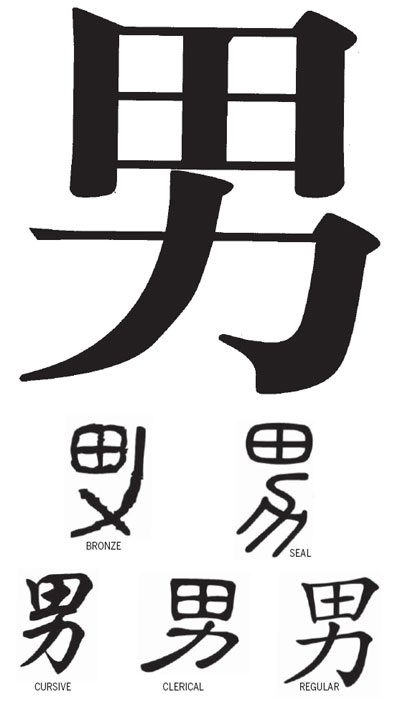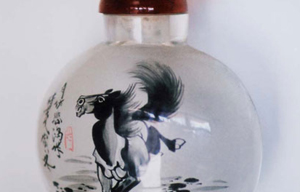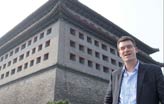Plows, tough guys and real men
Updated: 2011-09-23 09:11
By Lao Huang and Xiao Chu (黄伟嘉, 储丹丹), Revised by Huang Dekuan (黄德宽) (China Daily)

在这个时代,怎样才"够男人"?
On the character | Man
Chuck Norris. Rocky. Charlton Heston. No, this isn't an article on the Chinese character for "badassery" - it's about 男 (nán), which means "man". Although these days, tough guys like Chuck and Stallone may epitomize what we think of as "manly", back in ancient China, masculinity had less to do with wielding fists as it did plowshares.
The character 男 first appeared more than 3,000 years ago in oracle bone inscriptions as a combination of the characters 田 (tián, field) and 力 (lì, power). 田 was designed to look like a ridge of earth, while 力 was modeled after the 耒 (lěi, plow), which, at that time, had two prongs like a fork. Together, the two characters meant agriculture; soon they came to symbolize "man", since, at the time, farming was an entirely male domain.
In oracle and bronze inscriptions 男, 田 and 力 are almost all arranged left-to-right. But when calligraphy came along, they started to be written vertically, as the present arrangement.
But the evolution didn't stop there. Though 男's earliest meaning was "male", later it also came to stand for a rank in ancient China's 爵位 (juéwèi), or feudal nobility. 男爵 (nánjué, baron) was the last (often shortened to 男). In ancient times, people also injected a little royal flavor into their own homes by using 男 as an honorific for their sons. For example, 长男 (zhǎngnán, the eldest son).
Today, 男's main connotation is male, though it's used to form a number of different words related to men and masculinity. 男人(nánrén) is a general term for adult men, while 男儿 (nán'ér)can mean either boy, or - getting a little closer to Norris territory - "real man". Taking it a step further is 男子汉 (nánzǐhàn), another honorific for grown men, similar to "manly man".
Of course 男 isn't always prancing around stag - just as often, it's joined by 女 (nǚ, woman) in terms such as 男耕女织 (nán gēng nǚ zhī, men plow, women weave). Though the saying originally referred to the division of labor in farming households, it now describes families in which men work, while their wives manage the household.
These days, a popular phrase, 经济适用男 (jīngjì shìyòng nán), has emerged, which refers to men who are seen as "good providers". These kinds of men are typically average looking, have a mild temperament and earn a salary that is good though not outstanding. They're also family men, which means they shun bad-boy habits like smoking, drinking, gambling and cavorting about town with "special lady friends". Best of all, they're more than willing to share their earnings with their wives, all of which makes them the ideal marrying type.
While, to some, this may seem slightly antiquated, others claim that men's role as provider of the family always has been and always will be - as foretold by the ancients' invention of the character 男. In those days, men depended on their plows and their strength to eke out a living from their fields for themselves and their families. Now, men's homes and offices have become their 田 and 能力(nénglì, capability), their plows. They may not be sweating under the hot sun, but many are still the ones bringing home the bacon. How's that for manly?
- Translated by Liz Tung (董怡)

(China Daily 09/23/2011 page19)
E-paper

The snuff of dreams
Chinese collectors have discovered the value of beautiful bottles
Perils in relying on building boom
Fast forward to digital age
Bonds that tie China. UK
Specials

Let them eat cake
Cambridge University graduate develops thriving business selling cupcakes

A case is laid to rest
In 1937, a young woman'S body was found in beijing. paul french went searching for her killer

Banking on change
Leading economist says china must transform its growth model soon
